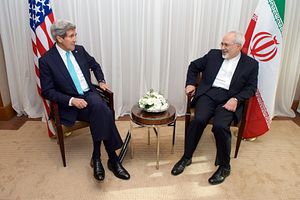The Iran deal has officially been implemented.
Yukiya Amano, director general of the International Atomic Energy Agency (IAEA), certified that Iran had complied with its obligations under last July’s Joint Comprehensive Plan for Action, an international deal in which Iran agrees to limit its nuclear program in exchange for considerable nuclear-related sanctions relief from the United States, European Union, and the United Nations. Amano’s statement triggers the Iran nuclear deal’s so-called “Implementation Day” milestone. “A lot of work has gone into getting us here, and implementation of this agreement will require a similar effort,” Amano said. “For our part, we are ready to get on with the job,” he added.
“Today marks the moment that the Iran nuclear agreement transitions from promises on paper to measurable progress,” Secretary of State John F. Kerry said, speaking in Vienna. “United States’ friends and allies in the Middle East and the entire world are safer, because the threat of nuclear weapons has been reduced,” he added.
For Iran, the IAEA’s confirmation of it having met its obligations, which included the dismantling of IR-1 centrifuges, shipping over 10,000 kg of low-enriched uranium out of the country, and redesigning a heavy-water reactor facility at Arak, means will gain access to over $100 billion of frozen foreign assets, most of which will go toward servicing the country’s existing debts. Iran will allow for the continuous inspection of its nuclear facilities by the IAEA. For the Iranian government, led by President Hassan Rouhani, attaining sanctions relief under the Iran deal fulfills a major campaign promise that helped usher him into power back in 2013. With an Iranian parliamentary election around the corner in late February, the implementation of the Iran deal could prove politically useful for Rouhani and like-minded moderates.
In the United States, the Obama administration released an executive order revoking previous executive orders (13574, 13590, 13622, and 13645) which applied nuclear-related sanctions to Iran. In doing so, the United States complied with its obligations for “Implementation Day.” The order notes that “Iran’s implementation of the nuclear-related measures specified in … the Joint Comprehensive Plan of Action … marks a fundamental shift in circumstances with respect to Iran’s nuclear program.”
Since the conclusion of the nuclear deal last summer, diplomatic channels between the United States and Iran, who do not maintain formal diplomatic ties, have improved. Earlier in the day, before Amano’s announcement, Iran released five U.S. citizens that had been imprisoned in the country, including Washington Post report Jason Rezaian. Speaking in Vienna, Kerry noted that the swap was unrelated to the nuclear agreement. Reuters notes that the Obama administration pursued a back channel to negotiate the release of these U.S. hostages. The United States released eight Iranians who were accused of violating sanctions.
With the lifting of sanctions under the nuclear deal, Iran will largely be able to reenter the global economy after years of isolation for its nuclear program. Despite the lifting of nuclear-related sanctions on Iran under the JCPOA, other sanctions will remain in place against the Iranian government. Concerns remain among critics of the nuclear deal in the United States and elsewhere that nuclear-related sanctions relief will allow Iran to intensify its support for non-state groups in the Middle East, including Hezbollah, and bolster its support for the government of Bashar al-Assad in Syria.

































